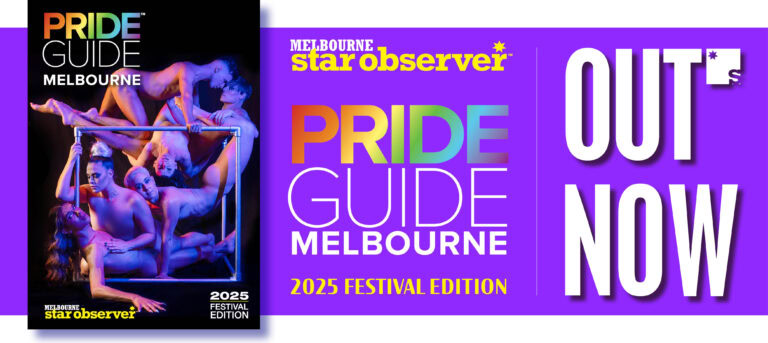
Do it now (11/9/2003)
The senate yesterday passed a motion calling on the federal government to introduce legislation to recognise same-sex couples.
The motion comes a week after the United Nations Human Rights Committee issued a judgment in a case that decreed that Australia must move to amend such laws.
The case in question was brought before the committee by Sydney man Edward Young, who was refused a bereavement payment and surviving widow’s pension by the Department of Veteran’s Affairs after the 1998 death of his partner, Larry Cains, who served in Borneo during World War II.
The government responded to the judgment with a dour statement declaring they would consider the committee’s views, but noted that the committee is not a court and its views are not binding.
The senate motion in support of reform was introduced by Australian Democrats’ senator Brian Greig as an urgency motion, which meant that it had to be debated and voted on immediately. It was passed after an hour of intense debate with the Democrats, Labor and Greens in support and the coalition, One Nation and independent Brian Harradine voting against.
Greig hailed the motion as the strongest resolution in favour of broad-based commonwealth gay and lesbian law reform that has ever been debated or voted on in the federal parliament.
The legislative activism that I and others have been involved in has now brought us to a new benchmark-¦.We are unlikely to get any reform under Howard but it is now clear where all the minor parties stand and it bodes well for reform under a future Labor or perhaps even under a Costello government, he told the Star.
The shadow attorney-general also announced that a federal Labor government would amend laws which discriminate against same-sex couples.
Over the last few years we have seen Labor governments at the state and territory level undertake comprehensive law reform to address discrimination against Australians in same-sex relationships. Similarly, it is federal Labor’s intention if elected to undertake comprehensive reform of federal laws to remove such discrimination, including laws governing the payment of government benefits, said the shadow attorney-general, Robert McLelland. If this is done in a comprehensive way, Australians in same-sex relationships will not be forced to go all the way to the UN to assert their right to live free from such discrimination.
The federal government had argued that Young was not entitled to the surviving widow’s pension as the relevant act only recognised married and de facto heterosexual relationships. However, the UN Human Rights Committee found that in so doing, the Australian government had violated article 26 of the Covenant on Civil and Political Rights, which guarantees all citizens equality before the law. Australia has 90 days to respond to the judgment.
Local human rights activists have hailed the committee’s unanimous judgment.
Young’s lawyer Michelle Hannon said it was an extremely important step for human rights in Australia, while ANU law professor Wayne Morgan described it as the most significant statement that a UN body has ever made about the equality rights of same-sex couples, and in that respect it will have effects all around the world.
Morgan said the domestic implications of the judgment were just as profound.
Federal law often defines -˜couple’ in terms of married or heterosexual de facto couples, and that’s exactly the sort of definition that the committee has ruled is in breach of Australia’s human rights obligations. This should have effects in superannuation law, in tax law, in social security law as well as the laws that govern the armed forces, he said.
Gay and Lesbian Rights Lobby co-convenor Rob McGrory said the decision was a wake-up call for the Howard government.
The Lobby calls upon the Howard government to enact legislation that -¦ ensures equality for all Australians and a fair go for all Australians, regardless of their gender or sexual orientation, he said.
McGrory welcomed federal Labor’s commitment to law reform, saying the Lobby would see such law reform as including areas such as superannuation, taxation law, social security law, immigration as well as a federal anti-discrimination act.
Simon Rice, president of the group Australian Lawyers for Human Rights, stressed the importance of Australia adhering to its international obligations.
Like any legal system, international law only works with the cooperation of its participants, he said. No legal system exists without those taking part in it respecting it. International law is only going to continue to operate effectively if those participating in it respect it; that’s why the onus is on Australia.
Morgan said the judgment would be significant domestically even if John Howard did not act upon it.
If Howard will not act, this decision gives a mandate to any future leader of the coalition to immediately change the laws, and it also gives a mandate to any alternative government to immediately end all of those discriminatory definitions of -˜couple’, he said.
The man at the centre of the case, Edward Young, said he brought the case to the UN after unsuccessful appeals to the Veteran’s Review Board and the Human Rights and Equal Opportunities Commission.
I firmly believe that anybody who lives in Australia or who is an Australian must be treated with equality before the law, no matter what their sexual orientation is, he said.
Young described his late partner as a very private man, who was very interested in fair play.
He would have been very happy to know that we have got this far, because he would have been appalled about the discrimination, Young said.









